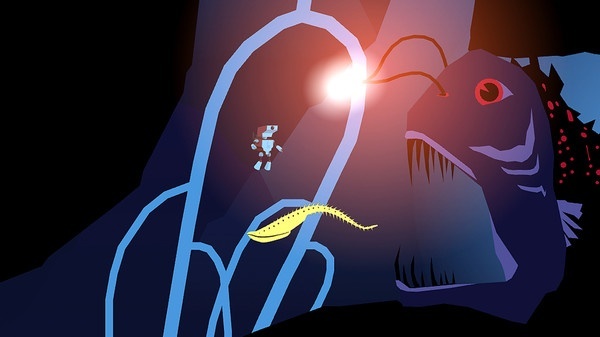Planet of the Eyes (PC) Review
By Thom Compton  09.09.2015
09.09.2015

As gamers, it's easy to view games as a collective unit instead of various expressions. Many very thoughtful games are often lauded as too short, too "thinky," or just lazy design. While not every thought-provoking game hits its mark, many still do. Without games like Journey, Teslagrad, Flower, or Entwined, many people would be unaware that some games have deep and rich experiences to give them in small spaces. Planet of the Eyes is another such game.
Planet of the Eyes comes in at a brisk two hours, give or take, for a first play through. Every second of that brief run the game seems to be thinking, "How can we kill the player?" It is challenging beginning to end, teaching how things work pretty much constantly. This continuous feeling of learning is nice, but very few aspects carry over to the next challenge.
There is nothing in the way of tutorials, but this isn't a bad thing. The controls are very atypical for a platformer, so picking them up and going is only a matter of remembering how to play Mario or Sonic. Jumping could be a bit tighter, but it hardly ruins the experience.
Easily the biggest attraction comes in the music and story. The soundtrack is almost a sci-fi lullaby meant to entrance and lull players into a false sense of security. It's a tricky mission for a game, and Planet of the Eyes pulls it off with the ease of a virtuoso. The best music sinks into the background, so the user forgets it's a separate entity, and absorbs it with every other element. This game does that perfectly.
The story is told through various audio logs, none of which are hidden. In fact, every one of them is on the path. The tale is a haunting one of love and regret that bounds with reliability, despite being a very sci-fi style narrative. It's actually profound, considering the amount of time there is to tell the story, how relatable the main character and the voice on the audio logs becomes. It almost feels like a child desperately searching for their parent, and it's something more titles could take a cue from.

Planet of the Eyes does falter, though, and actually comes up short pretty often. Even though the lack of tutorials doesn't impede progress, later on it becomes almost entirely trial and error. While this is nice and rewarding to begin with, it eventually becomes cumbersome. Little bread crumbs are left to help discover the way, but these hardly help as the solutions to issues become more and more obtuse.
The graphics are pleasant, but slip up in the later segments. There's a clear sci-fi feel to everything in the game, initially, but it eventually gives way to minimalist environment design. Crudely drawn vehicles, platforms, and hazards hold back the truly vibrant nature of earlier levels, and it's a shame to see it fall apart.
All this aside, Planet of the Eyes holds together enough to reach its finale. Despite a short playtime, it's an adventure worth diving into. There's little in the way of replay value, despite achievements, which are very well thought out. Only one of them is as simple as playing through the game, and it's refreshing to see the designers really pushing people to explore, advance, and even die in ways they never would.
Pulling it to a close is sad, and it's a sombre tale worth revisiting. While it may show signs of unravelling in the final act, it remains cohesive enough to get to a satisfying conclusion. Too many gamers may hear about the short run time or simple controls and overlook this gem. It's imperative they don't, because despite its flaws, Planet of the Eyes is everything a short, simple, but highly thought-provoking game should be.

Cubed3 Rating
Great - Silver Award

The team over at Cococucumber should rest easily knowing they made something so vibrant and full of life. While it hits more than a few bumps towards its finale, Planet of the Eyes comes through the finish line as an excellent experience worth having. Almost like a short poem or brief jazz piece, it's an excellent way to spend an afternoon, feeling immersed in an experience that's truly one of a kind.

![]() 8/10
8/10
![]() 0
(0 Votes)
0
(0 Votes)
 Out now
Out now  Out now
Out now  None
None  Out now
Out now Comments
Comments are currently disabled

 Sign In
Sign In Game Details
Game Details Subscribe to this topic
Subscribe to this topic Features
Features






 Top
Top

